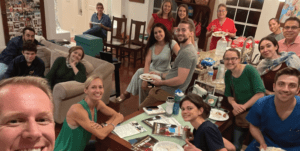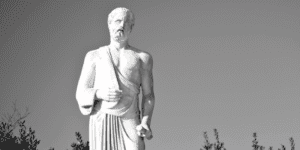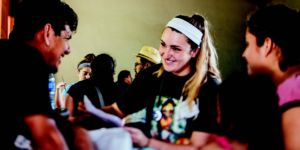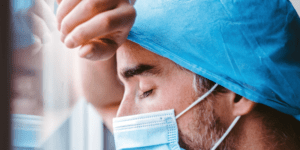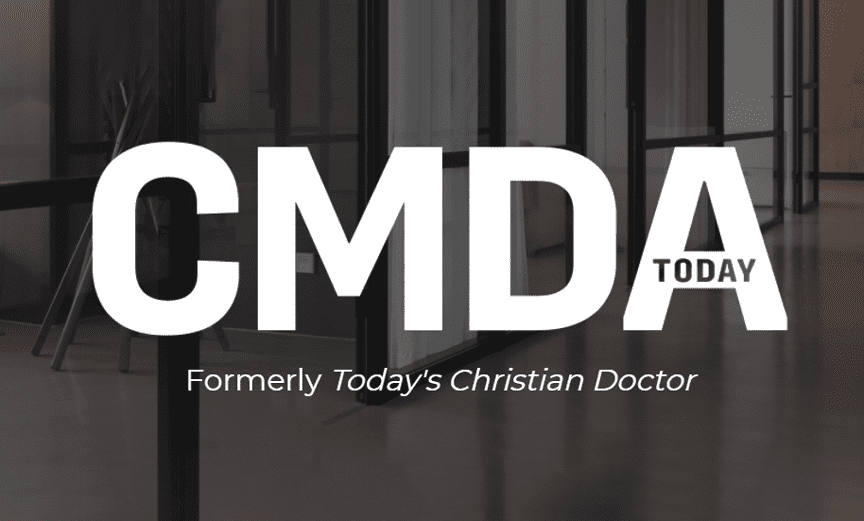
Courage through the Crisis: Stories from the Frontlines
More than a year ago, we watched as New York City and the surrounding area became the epicenter of the COVID-19 crisis when the pandemic initially broke out in the United States. At this year’s CMDA Virtual National Convention, we shared stories from several CMDA members from the area whose lives and work in healthcare were impacted by the virus. As we consider how COVID-19 has changed our world and our profession in healthcare, these stories share how God has worked in and through our members during this crisis.
More than a year ago, we watched as New York City and the surrounding area became the epicenter of the COVID-19 crisis when the pandemic initially broke out in the United States. At this year’s CMDA Virtual National Convention, we shared stories from several CMDA members from the area whose lives and work in healthcare were impacted by the virus.
As we consider how COVID-19 has changed our world and our profession in healthcare, these stories share how God has worked in and through our members during this crisis.
Seeing the Purpose Behind the Virus
featuring Drs. Greg and Ali Tsai
Drs. Greg and Ali Tsai live and practice medicine in Manhattan. Greg is an ENT physician, while Ali is an OB/Gyn who works part-time with a homeless shelter.
In late February 2020, Greg and his co-workers at Mt. Sinai Hospital started hearing about the fast-spreading virus. They knew it was going to impact them, but they had no idea the extent their everyday lives and practices would be impacted. “In our specialty, we see a lot of people with ear, nose and throat problems, and we knew this was a respiratory problem,” Greg said. “In our line of work, it was a high risk to contract the virus.”
On March 15, they made the decision to close down the office. “On March 16, I was calling patients to let them know their appointments were cancelled,” Greg said. “When I came back the next day, around noon my office manager said we were closing and doing everything virtually. When I headed home, I was feeling a little warm. That night, my temperature rose to 102, and I realized I had a fever. That’s when I got a little nervous.”
“At that point, it was very concerning,” said Ali. “He was put in isolation and he stayed in a bedroom of his own, and my son and I tried to minimize contact with him.”
At that time, only hospitals were equipped to perform any testing for the virus. When Greg’s fever didn’t go away, and he developed body aches and fatigue, he went to the emergency room to be tested. “Everyone’s experience is different, mine was characterized by high fevers for about two weeks and body aches. No matter what position I was in in bed, it was very uncomfortable,” he said.
After about a week, Greg’s symptoms decreased, and he started to feel a little better. But the very next day, the fever came back with a vengeance.
“When the fever went away after a week, I thought I was finished with it,” he remembered. “So when the second round came, I was starting to get anxious. Although I was never short of breath, I knew that it didn’t feel comfortable when I took a deep breath. Even walking around the bedroom, my chest felt tight and I was worried my lungs were going to go. During that second week, I started to feel very desperate. Because of that desperation, my prayers become more fervent.”
Despite Greg’s growing concern, Ali felt an overwhelming sense of peace.
“I can’t explain it, but I had this peace that he would be fine,” Ali said. “We grew a lot together spiritually in that we prayed with a fervency we hadn’t before. On day eight, when he started getting worried, I started reaching out to friends. We had this cadre of people through the CMDA network who we met through ministry circles, and we’re so grateful for this community of believers who guided us. People prayed in ways that we hadn’t prayed before, and they taught us how to pray differently.”
After nearly three weeks of quarantine, Greg was feeling better and excited to return to “normal” life, but healthcare was still anything but normal. Patients in the hospital needed tracheostomies in order to be taken off the ventilator, but it was a risky procedure that could infect the physician performing the procedure.
For Greg, the procedure was far less risky, because he had developed antibodies to the virus: “I teamed up with a couple of residents who had also tested positive for antibodies, and we ended up doing all the tracheostomies on COVID patients throughout the hospital.”
After nearly a month of treating patients on the COVID wards, the number of cases decreased, and New York was finally seeing relief from the virus.
Now, more than a year since the original outbreak, Greg and Ali have forgotten some of the details of his illness, but they haven’t forgotten how God led them through the crisis.
“God was showing me how faithful He is, and I think that’s why I had this peace that Greg would be ok,” remembered Ali. “It reinforced that God is behind everything that is good. There is a spiritual battle going on. How do we fight this spiritually, not just physically and not just with medication? I am so grateful that God has allowed us to have medical training, but it was really the faith part that made a difference. Only our faith in the Lord was allowing us to see any purpose behind this virus.”
Living and Serving in the Moment
featuring Tom Theocharides, MD
Dr. Tom Theocharides is an OB/Gyn and cosmetics surgeon who practices in Central New Jersey. He also loves teaching, so he spends time teaching residents some of the skills he’s learned in his three decades of practice.
When the Coronavirus hit, the cosmetic part of his practice shut down completely for three months, but the obstetrics continued. During that time, he was doing quite a bit of on-call coverage at one of the local hospitals. It was a big learning curve for everyone, and as time progressed, it became obvious they were being exposed to COVID patients because they didn’t have the capacity to test all of the patients.
“What we learned later, was that we had patients coming in who were potentially infectious,” he remembered. “They didn’t know it, and we didn’t know it, and we didn’t have adequate protection. In the labor and delivery situation, we were having to make it up as we went along. It was literally a learn-as-you-go situation, and it was quite challenging to protect ourselves, as well as those patients that needed attention.”
For Tom, his faith was the rock that helped him deal with the stress and the fear of the unknown while treating patients. “I reminded myself that I really have little control over anything,” he said. “When I looked at the virus and the potential threat, it was certainly something I needed to respect. Since I know where I’m ultimately spending eternity, which is with Christ, which is far better than this earth, I was never really afraid of the virus per se. Cautious, yes. Some days had more stress than others, absolutely, but I was doing my part and casting my cares on Him because He cares for me.”
The peace Tom experienced because of his faith in Christ added a sense of calmness to the hospital environment, and it gave him opportunities to talk about his faith with his colleagues and with his patients. “When people ask how I’m doing, one of my answers is to say, ‘Better than I deserve.’ That statement gave me the opportunity to bring in my perspective that we serve an amazing God who pours out His grace and mercy,” he said.
As Tom reflected on those weeks and months of uncertainty when the virus first appeared, he said it was a fresh reminder to appreciate every day and have more empathy for the hurting, the suffering and the grieving. He said, “I’d like to think this has made me a better doctor. I have to regularly remind myself to let His love shine through to my patients and be sensitive to what they say, and particularly what they don’t say, in terms of making an emotional connection.”
One of the most important lessons he learned through his work serving on the frontlines was that it is so easy for healthcare professionals to neglect their own needs. “We’re trained to help others and think of others, put ourselves next. We don’t eat because there’s a need. We put off sleep. It’s so easy to neglect ourselves and forget that we are human, and we need care. It reminded me how important it is to take care of myself. I think of the Scripture that says, ‘Love your neighbor as yourself,’ not at the cost of yourself. And yet it’s so easy for us as healthcare professionals to forget about ourselves. And that includes encouraging one another, leaning on one another and admitting when we need help, most importantly.”
Tom took advantage of the OASIS, which is a spiritual respite meeting FOR healthcare professionals BY healthcare professionals organized by the CMDA chapter in New York City. “That was an excellent opportunity to have us as healthcare givers share our struggles, share our struggles, share our hurts, share our fears and pray for one another. It reminded me that we all need each other. It’s so easy in this technological age to isolate ourselves, but OASIS was a very positive atmosphere that helped us connect and pray for one another.”
In this time of stress and struggle and fear, he would often text his Christian colleagues and tell them, “Be healthy, be safe.” And as he did this, the Holy Spirit impressed upon him that it’s not about safety, but it’s about being in the Lord’s perfect will.
“I reflect on the times, especially in the beginning when there was so much uncertainty, that I looked at my schedule and said, ‘Oh, I’ve got two 24-hour calls this week. I really would rather not do it. I’d rather be home.’ But someone had to do it, and it’s not about my comfort zone,” he said. “It’s about serving and doing my part, protecting myself and being cautious. It’s not about being careless. God doesn’t call us to be careless, but he calls us to live care free, because we cast our cares on Him. After all, this life is temporary. I’m not living for this moment, for this life, we are called to live in the moment and serve Him.”
Sharing Masks and Sharing Jesus
featuring Linda Huang, DDS
Dr. Linda Huang is an oral maxillofacial surgeon who has a private practice in Flushing, New York. On a normal, day to day basis, her patients are all mostly outpatient.
Like most healthcare professionals, she wasn’t prepared for the shutdown that hit in March 2020. They could still open once a week to see emergency patients, but all non-essential services had to be cancelled. However, while the office open that one day each week to see emergencies, they didn’t have any N95 masks to protect their staff members.
“I was so naïve. I just thought, ‘Oh, supplies are always going to be there. We just have to call if we run out,'” Linda remembered. “By the time I started ordering, there was nothing left. And we were still seeing emergency patients. And at that time, we were hearing more and more about COVID cases on the rise, and we realized how contagious it was.”
It became an urgent search for masks, and that search led Linda to pray for the Lord’s guidance in finding the masks so she could keep treating patients safely. Thanks to the efforts of the CMDA New York area leadership, Linda received 10 entire boxes of masks just a short time later. It was far more masks than she needed, and she knew immediately that she wasn’t going to hide them away and keep them all for herself.
“I knew other dentists who were working,” she said, “so I started calling my dental colleagues. I wanted to share the love of Jesus with them. That began the small project of distributing N95s to my dental colleagues. One office manager was waiting at the curbside for me to drop them off. After I parked my car nearby on the street, I asked how things were going, and she said, ‘We don’t know when it’s ever going to get better, I can only pray that it gets better.’ I said, ‘Who do you pray to?’ And she said, ‘Oh, I don’t know, whoever answers.’ And I said, ‘Really? Can I tell you about my God who listens to prayers?’ She told me I could, and I began to talk to her from Genesis and how God created man and woman, to the fall of man, to God sending a redeemer to bear our sins and to be hung on a cross so we could have eternal life. I asked if she wanted to accept Jesus, and I led her into a repentance prayer to accept Jesus. And she is now a sister in Christ, all because of some N95 masks.”
As a business owner, wife and mom, she was still incredibly busy during the shutdown, but it also meant she spent more time with her family, more time in prayer and more time with God.
“As I’m drawing closer to the Lord, and I’m reading Scripture, I’m understanding that we are His people. God has made a covenant with His people, and no matter what, He is with us,” she said. “I’m not promising people that they will not get COVID, but I do know the promises of God. So even if I do catch COVID, I know that the Lord is with me, and that He is going to help me get through this. I’m still working and seeing patients, so the potential of bringing something home is there. But we pray Psalm 91, every day, the whole family. We pray and we hold onto the promises of God. We cannot live in fear, because fear cannot have that control over us. We are going to have the promises of God, and we are going to live in confidence and live in God’s victory.”
Being a Beacon in the Community
featuring Drs. David and Janet Kim
Drs. David and Janet Kim are the co-founders of Beacon Christian Community Health Center in Staten Island, New York, where they practice internal medicine and pediatrics. As a federally qualified health center, Beacon provides whole person care, which is care directed toward the physical, mental, emotional, relational and spiritual aspects of health.
An extremely ethnic and economically diverse community, Staten Island is actually a medical underserved area. The nearest hospital is five miles away, and it’s difficult for many of their patients to travel that distance. So when COVID-19 first appeared in Manhattan in February 2020, the Kims started making preparations for the inevitable onslaught in their community. “We went into this knowing we wanted to do whatever we could to stay open and to continue to serve our patients as long as we would be able to do so,” Janet remembered.
That decision to stay open when other healthcare facilities were closing caused a great deal of controversy among their colleagues. “We’re the only ones that really have the ability to meet it head on and fight it, and we felt that this was where we needed to be,” said David. “We needed to show the community that we weren’t afraid, and we weren’t going to run away from this thing. And that we were going to stay and fight it alongside them.”
“When patients heard that we were still open, not only were they grateful, but it was also an assurance to them that we were still there,” said Janet. “We really believe that was our way of demonstrating that Jesus hasn’t left them. If we stay open, we are here to show them that God’s given us the ability to do this.”
In the midst of treating COVID patients, Beacon also committed to offering testing, and they became the only outpatient facility to do walk-in tests of any kind of large scale on Staten Island. In fact, there were very few places people could get tested in general, since much of the population don’t have cars and had no way of traveling to other testing locations.
“I’ve never experienced a sense of hopelessness until then” said Janet. “I’ve always heard of [missionaries] seeing people die in front of you and knowing there’s nothing you can do to stop that. It was the first time where I felt I was having third-world problems while being in a first-world country. I remember saying, ‘Something’s got to be done. There’s got to be something we can do. I can’t just sit here and do nothing.'” So, in coordination with several colleagues and staff, plus a great deal of research, Janet developed a treatment protocol that allowed them to test, treat, track and teach patients on an outpatient basis, without requiring them to visit the hospital. As a result of that protocol, they prevented more than 100 patients who were asymptomatic from going to the hospital, and not a single one of their patients under the protocol ever ended up going to the hospital at all.
“One of the Bible passages that became our battle cry was Psalm 91,” said Janet. “The chaplain on our staff printed off copies of Psalm 91 and posted that in each of our exam rooms. Knowing that was there as a resource for patients to be able to read and to take comfort in was an amazing opportunity and tool to share that word with them.”
As they continued treating patients, they were able to see firsthand the impact of prayer and God’s Word on their patients. “I tell people that I liken this to being in the valley of the shadow of death, because there’s about a three- to five-day period where it really is that,” said Janet. “Part of the pathology of this disease isn’t just the physical, but it is the emotional and the spiritual. It really does help them in the recovery, and it’s been amazing to see that.”
In the months since it first appeared, COVID hasn’t gone away. And day by day, they have been living out Psalm 91 in real ways. “When the Bible says, ‘We are under the shadow of the Almighty,’ we have really felt like we are under the shadow of the Almighty,” said David. “Because God has been very real to us, and because His Word has proven to be true over and over again, I feel like we have seen people around us develop a greater resiliency toward handling COVID and life in general. For us to see how God has been protecting us throughout has been an incredibly humbling experience.”
Throughout the last year while their community faced a long period of isolation due to the virus, David and Janet saw how people were feeling the loss of relationship with others, something normally so prevalent in their community.
“One of the first patients we saw about three or four weeks in needed to renew his blood pressure medicine,” said David. “At the end of the visit, I said to him, ‘You’re wearing gloves, I’m wearing gloves. Let me shake your hand.’ In the safest way possible, I shook his hand, and he broke down in tears. He said, ‘Doc, you’re the first person to touch me in three and a half weeks.’ He was so overcome with the emotion of feeling that human touch again. That was when I realized we had made the right decision in staying open and just being there. Trying to live up to our name of being a beacon in the community. We were going to respect the disease, we were going to follow whatever precautions we needed to follow, but we were not going to fear the disease. That in and of itself was the biggest point of ministry we were able to provide to the community, just the fact that we were there, and we didn’t leave.”
Mandi Morrin is CMDA’s Director of Communications and the editor of CMDA Today. She has served with CMDA for more than 10 years, where her responsibilities include magazine editing and publication, graphic design, coordinating the ministry’s communication initiatives, media relations and more. She received her bachelor’s degree in communications with an emphasis in journalism from Milligan College in Tennessee in 2006. Prior to joining CMDA, she worked in retail marketing and administration. Despite having lived in Tennessee for nearly 20 years, Mandi is an avid Kentucky Wildcats basketball fan. Mandi and her husband Chad reside in Bristol, Tennessee.
This Feature Story Appears in:
Other Recent CMDA Today Articles:
- « Previous
- 1
- …
- 3
- 4
- 5

